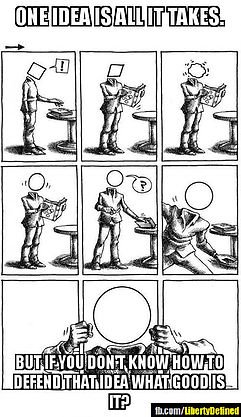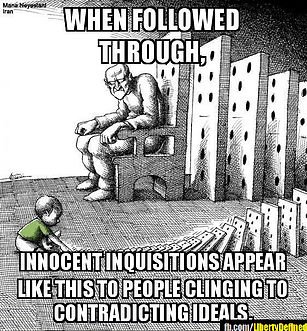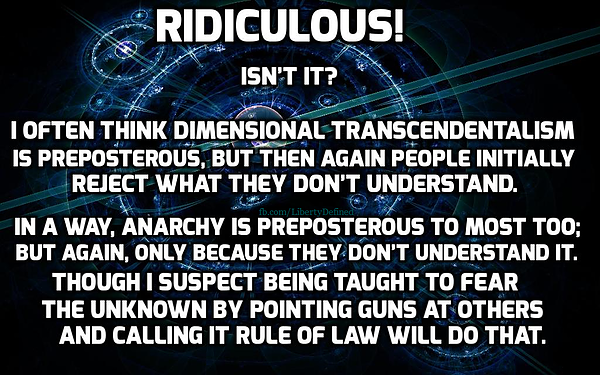Principles are like alarm clocks
Many of us use alarms of some sort. We are disgruntled often times in the mornings when we hear that dreaded peacefully soft chiming which came equipped with our smart phones. Maybe we are even angry at the loud, obnoxiously high pitched beeping of a little square quartz clock we may have acquired in the late 1980s. But we have certainly all turned off our alarms and promptly fallen back asleep.
Now to be clear, I’m not talking about the days where we wake up to an alarm only to be annoyed that we forgot to turn it off the night before so we could sleep in. No. I’m talking about the days where we have responsibilities to be awake, prepared to interact with the world by means of following through on previously acknowledged appointments. You know, like your employment at Pencil Pushers’ Inc., Big Box Mart, or Cyberdyne Automated Robotics Systems Unlimited!
We know why we set the alarms. We recognize that training our bodies is difficult. And of course training our bodies to wake up every day at a specific time can take weeks, months, and sometimes years of the same routine. I work for a large online distributor today and have had the same shift hours since I started three years ago. Before that I worked rather similar hours at a mom & pop restaurant. And years before that, I worked for an airline with nearly identical hours!
So going on nearly a decade of a similar schedule, my body naturally wants to wake up between the hours of 06:30 and 07:30; often regardless of when I went to bed. Of course there is some deviation from this but it is relatively close every day. So what does this have to do with principles?
Well, as a kid I was told to condition my body by my father to teach it to act a specific way. Now I don’t really know if this was a military concept, something unique to my fathers’ generation of baby boomers, or if this was of a different nature. I do know that it is fairly common in practice. I’ve encountered many people who share similar experiences growing up.
And it is in this concept which the notion of just knowing when to wake up comes into play. With that in mind, have you ever been told or heard in a movie, “when the time comes, you’ll just know the right thing to do?”
Well, I have been told that plenty of times in various ways. It is also a powerful, yet mystically clouded line of dialogue from the Empire Strikes Back film delivered by Jedi Master Yoda. The exchange on Dagobah goes some like this:
Luke asks, “But how am I to know the good side from the bad?”
“You will know; when you are calm, at peace, passive,” Yoda tells him.
The trouble is that there are no clearly define parameters from which to judge the difference from right and wrong. What test is being used to dictate what is right? What test is being used to dictate what is wrong?

Just as it is explained not at all transparently by Yoda, so to it is invoked by others that, ‘If you don’t understand the difference between right and wrong, then you are the problem with the world.’ That is a lot like saying: if you don’t understand how to wake up in the morning and be on time then you are what is wrong with your life.
That line of thinking is neither useful nor productive. It is in fact indicative of two strong possibilities. One is that the invoker of such a statement has no idea beyond a poorly interpreted sentiment what they are relaying. Another is that they are simply not interested in making time to explain an idea as much as they are lashing out for some reason.
So if we want to understand further how principles are important, let’s look at the reason why we set alarms to wake up. While it is possible to train our bodies to wake up at a specific time every day, the amount of training this requires will inevitably vary based on each individual. Unfortunately, for so many of us, arguably the majority of us, we don’t have the luxury of weeks or months or years to train ours bodies. Additionally, life is filled with so many possible variables that training one’s body to wake up at a certain time could also backfire. So the alarms which stimulate our audible senses are useful in helping us regain consciousness.
We want to regain our consciousness to ensure we are able to make our prearranged schedules out of respect to those we made the commitments with. This also helps create currency in terms of the quality of our characters when we do not want to require the threats or negative consequences of such to hold ourselves accountable personally, not just by others necessarily. This means that we choose to invest in ourselves by taking responsibility that helps others maintain their own responsibilities.
We serve our self interests by serving the interests of others as an investment in good faith which leads to trust and eventually loyalty. And that loyalty in time becomes of use to our own interests and self maintenance and improvement.
We ultimately recognize the value of alarm clocks as an investment in our ability to meet scheduling commitments. We understand why we use them in addition to how to use them. So the same idea can easily be applied to principles. If we understand how to use them but do not understand why we use them, life can become messy rather quickly. It can feel like a rat race to acquire as much cheese as possible because everyone else is doing the same. And if everyone is scurrying about to get as much cheese as they can, what will be left for me?!
We can feel like slaves to others because we do not understand the purpose of the tools we seem to be beholden to. We lash out at the things that we don’t understand. And we become rebellious towards the very ideas which are actually good ideas for long term self investments. The barrier to our thinking is that we simply do not know better for whatever reasons.

Alarms, as we’ve explored, are useful to help us keep our commitments to others when it is typically borderline impossible or just not at all practical to train our bodies to wake up on their own. The same is true with principles. We often know how to invoke them. We often have a good sense or notion of when to recognize them. And of course we have a general understanding in sentiment as to why we invoke them just like our use of alarm clocks.
But just as training our bodies to wake up at a certain time could backfire, relying on an inherent and unexplainable internal moral compass to know the difference between right and wrong could back fire in future generations. This is important because showing one’s philosophical work from start to present allows for further development and clarity. This in turns allows for greater consistency and application of principles in everyday life more openly. And at the end of the day, this gives us the litmus test we need to determine right from wrong, with more than just an ‘Idiots Guide on How to Be Morally Consistent!’ (Just a disclaimer, I don’t know if that is a real book or not.)
So the similarity comes in our inability to recognize in full the purpose of why we invoke principles. Generations of our ancestors have come before us devising all sorts of nouns which are tangible and intangible. So we have unintentionally become accustomed to being taught how to invoke or use these nouns but not necessarily why they are important and useful.
At this point it is pertinent to point out principles, or as others may associate them with morality and ethics, are meant to create boundaries between each of us whom invoke them. Principles are about recognizing the value others have placed upon themselves as a proactive means to one’s own self defense. This proactive stance has nothing to do with ‘carrying a big stick and walking softly’ so much as it has everything to do with making the time to show respect of the value others place upon themselves in the hopes that they will return the kind gesture as an investment in their potential future needs.
We want others to respect the value we give ourselves. So we justify showing in good faith the respect of the value they give themselves in hopes to create credit in the quality of our characters and avoid potentially destructive conflicts out of mistakes in the future. This is about being better than neutral with others and seeking out positive connections in order to encourage the worst our characters are viewed as is neutral, not negative. Once again, this is about setting boundaries.
But why do we set these boundaries? We set them because we want to avoid destructive or negative events in our lives from others capable of being reasoned and communicated with that we can, not control but, influence to some extent. We cannot fully truly control the actions of others. We can however encourage certain actions or discourage other actions. And we do this by being deliberate in how we control our own actions.

This is why principles are like alarm clocks. They alert us to the perimeter of where we need to stop certain actions and begin different actions in order to avoid negative consequences. But more importantly, alarms and principles are ultimately about encouraging positive actions which make our lives potentially and infinitely more enjoyable. Often times the focus is on the negative aspect of what happens if we do not recognize such principles; but that creates a damp and despair filled view on how we are controlled by the feelings of others instead of how we can mutually benefit positively through the feelings of others while not feeling enslaved, let alone actually being enslaved.
So when we invoke principles or morality or ethics, know that we are doing so for precise reasons. The details and context in which we invoke these may be different each time. The concept behind each invocation of such a principle, moral code, or ethical choice is always going to be the same. The truth of the matter is that in order to continually AND exponetially grow the possibilities of greater enjoyment in life, we will need more often than not the voluntary and peaceful cooperation of others we can communicate and reason with.
This is true because we have limited time to enjoy as we understand our conscious selves. Therefore we will not ever have enough time to consider every possible idea which may help maintain or improve the quality of our lives. And it is in the recognition of this concept that we set boundaries we call principles to proactively prevent negative or destruction actions (although innocent in nature) while seeking to invest in the quality of our characters for our future selves.
It is the potential of others to refuse to recognize the full extent of value we place upon ourselves if we simply turn off our alarms, if we reject the barriers principles set, when interacting with them. Mistakes are going to happen, without a doubt. How those mistakes are forgiven is going to be determined by a great many bits of criteria.
The criteria will range from an individual being conditioned unknowingly from the overwhelming majority of encounters in his life being mean, condescending, and negatively destructive to him leaving any transgression against him to trigger a subconscious reaction of extreme hostile prejudice and violate retaliation to a polite exchange of information through nonviolent communication in order to assess the situation and move on. Which set of criteria is used to determine the most beneficial response will be dependent upon how many people understand the importance of why principles are invoked in the first place; and of course by actually employing them with ever increasingly consistent clarity.
-JLD
Find out more about my works here:
I base all of my posts on previous content I've created in two books and multiple audio programs.
Download and read for free Liberty Defined and Morality Defined here,
https://www.smashwords.com/books/byseries/20333
Listen to my Liberty & Morality Defined presents audio series here, http://bit.ly/2eT3ZxN
If you're a Star Wars fan and would like to start the journey into a realm of fantasy following a journey of struggle against two separate empires and a galaxy of souls lost in a conflict still raging on after 10 million years, download and read for free book one of my Hunter's Gambit series, Revelations here, http://bit.ly/2b1QoBh
And visit me on Facebook at http://www.FB.com/LibertyDefined
& http://www.FB.com/JLimberDavis
Twitter @JimLimberDavis
Steemit @JimLimberDavis
If you enjoy the work I create, please encourage more of it with one time or reoccurring donations here, http://www.jimlimberdavis.com/donation-support